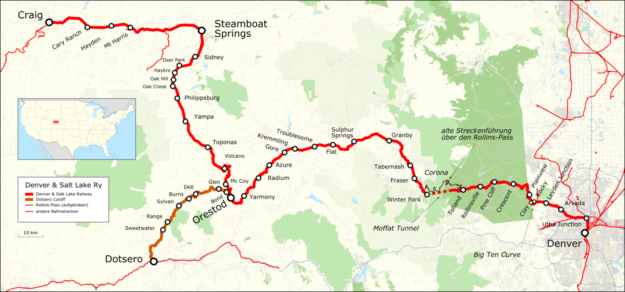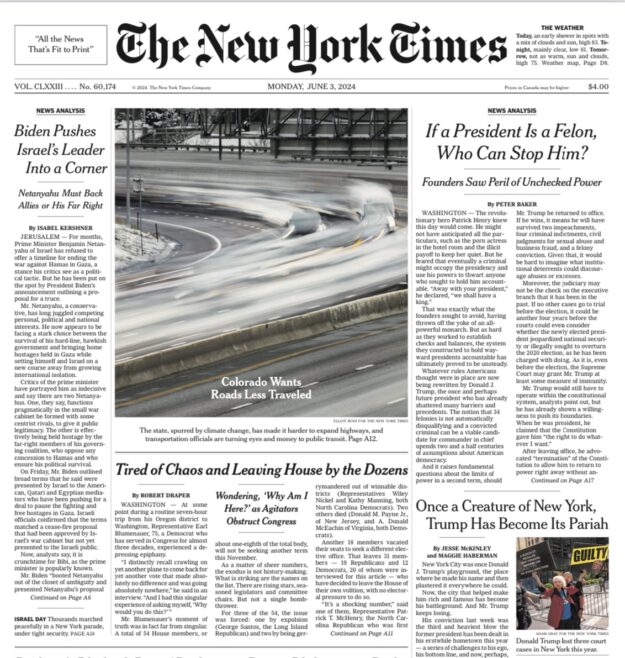Widgetized Section
Go to Admin » Appearance » Widgets » and move Gabfire Widget: Social into that MastheadOverlay zone
Roberts: Tennessee Pass Line rail revival hinges on success of Northwest Rail plan

A proposed Denver-to-Craig Northwest Rail passenger line, as state Sen. Dylan Roberts calls it, could have some significant spillover impacts on the local but long-dormant Tennessee Pass Rail line through Eagle County that Union Pacific (UP) also owns.
In a phone interview last month to discuss several rail-related bills passed by the Colorado Legislature last session and signed into law by Gov. Jared Polis, Roberts, a Frisco Democrat who grew up in Steamboat Springs and until recently lived in Eagle County, said the Denver-to-Craig line through Winter Park and Steamboat is now on a passenger-rail fast track.
He added, however, that the revival of all of part of the Tennessee Pass Rail line between Dotsero in western Eagle County and Pueblo on the Front Range – if local constituencies are onboard – could be boosted by the success of Northwest Rail. But it would most likely have to be funded by a return of freight trains, something Eagle County and its residents seem reluctant to embrace.

“I couldn’t speak for UP, of course, and what their economic model is, but [freight funding passenger rail is] likely based on what we’ve heard about the Northwest Rail line,” Roberts said. “The biggest key for folks who would like to see [the Tennessee Pass] rail line become active again and add in passenger service is the success of the Northwest Rail first.”
Envisioned as a commuter line for Steamboat and Winter Park resort workers living in less-expensive housing markets such as Craig, Hayden, Kremmling and Granby, as well as a line for tourists flying into Denver and the Yampa Valley Regional Airport in Hayden, Northwest Rail is on track because UP wants to replace waning coal-train traffic. One aspect of Roberts’ and state Rep. Meghan Lukens’ SB24-190 is that the law incentivizes companies utilizing the rail line.
“There are still a few hurdles that need to be cleared to make [Northwest Rail] a reality, but if we can do it and prove that it’s successful and both economically viable and popular with folks who want to use it, that will ease the burdens and the hurdles to getting the Tennessee Pass line open again,” Roberts said. “It also shows why it’s so important that we pass bills like Senate Bill 190 and keep freight activity going on those lines because we don’t want to lose the asset.”
While there’s a seasonal weekend ski train for snow riders traveling between Denver and Winter Park, regular, year-round passenger service between Denver and Craig ended in 1968 and on the Tennessee Pass line in 1964. The last time a freight train used the Tennessee Pass line between Pueblo and Dotsero along the Arkansas and Eagle rivers was in 1997.
“[The reason] we don’t want the asset of the [Northwest] rail line to become stranded the way the line in Eagle County has become is because getting that line back to operability is so much more expensive than just keeping an already operable line open,” Roberts said. “We heard that testimony a lot from [the Colorado Department of Transportation] during Senate Bill 190 [testimony] that it’s so crucial that we don’t let the Northwest Rail become a stranded asset.”
Union Pacific tried to fully abandon the Tennessee Pass line when it merged with Southern Pacific in 1996, sparking years of efforts to convert the rail corridor to an outdoor recreation trail, but the U.S. Surface Transportation Board rejected that plan because the line is the only other way through the Colorado Rockies besides the state-owned Moffat Tunnel at Winter Park.
And Northwest Rail from Denver to Craig will actually follow the Colorado River into northern Eagle County before turning sharply north at Bond, which is less than 40 miles from Dotsero. The so-called Dotsero Cutoff from Bond is currently used on the active Central Corridor rail line between Grand Junction and Denver, which travels through the Moffat Tunnel. Amtrak has daily passenger service on the line between Chicago and California’s Bay Area, with no local stops.
“There’s so much opportunity,” Roberts said of the dormant Tennessee Pass line, which is still active for an 11-mile stretch between Sage, near the Eagle County Regional Airport, and Dotsero for the Gypsum wallboard plant. “And, to be honest, the inactive rail line is not actually that long of a stretch, because folks on the Northwest Rail will have to still go down to Bond, and that’s where the spur will be to go north [to Steamboat]. It won’t be that much more difficult, in my opinion, to then do the spur south and hit Dotsero and then head east.”
In 2021, Union Pacific entered into a contract with Colorado Midland & Pacific Railroad – an entity owned by a short-line company also trying to build the Uinta Basin Railway spur in Utah to connect oil fields there with the Central Corridor line near Price, Utah. Eagle County joined a coalition of environmental groups in successfully suing to delay that project. That legal battle has since been referred to the U.S. Supreme Court.
Colorado Midland & Pacific sought to block oil-train traffic in favor of passenger and “light-freight” service between Sage, near the Eagle County Regional Airport, and Parkdale, just west of the Royal Gorge, where a dinner train currently utilizes a short stretch of the Tennessee Pass line. The feds rejected that expedited plan due the controversy of reviving rail traffic on the line.
At the time, rival rail company Colorado Pacific viewed the Colorado Midland & Pacific plan as a “paper barrier” to its bid to acquire the Tennessee Pass line from UP in order to revive through freight traffic all the way from Pueblo to the Central Corridor line at Dotsero, as well as a daily passenger line from Pueblo to Eagle County. Colorado Pacific Railroad has since lost interest.
Mike Jaixen, senior manager of corporate communication at UP, did not respond to requests last month for comment on the status of its talks with Colorado Midland & Pacific Railroad and any remaining interest in a Sage-to-Parkdale passenger and light-freight line locally. Nor did he comment on the status of UP’s lease negotiations with the state for use of the Moffat Tunnel. He did make clear that UP is opposed to stepped-up state efforts to regulate rail safety.
The Polis administration, meanwhile, is in the midst of a transition away from major road-improvement projects in favor of multi-modal transportation in the form of trails, buses and rail, proudly promoting a recent front-page New York Times story on the subject.
On June 4 Polis posted on X (formerly Twitter): “Most people don’t want to have a 45-minute commute each way. Coloradans do it out of necessity. Creating more frequent transit and housing opportunities that people can afford closer to job centers means less travel in a car, reduced emissions, and less time lost in traffic. Our @ColoradoDOT team is helping Colorado today and preparing for future generations.”



